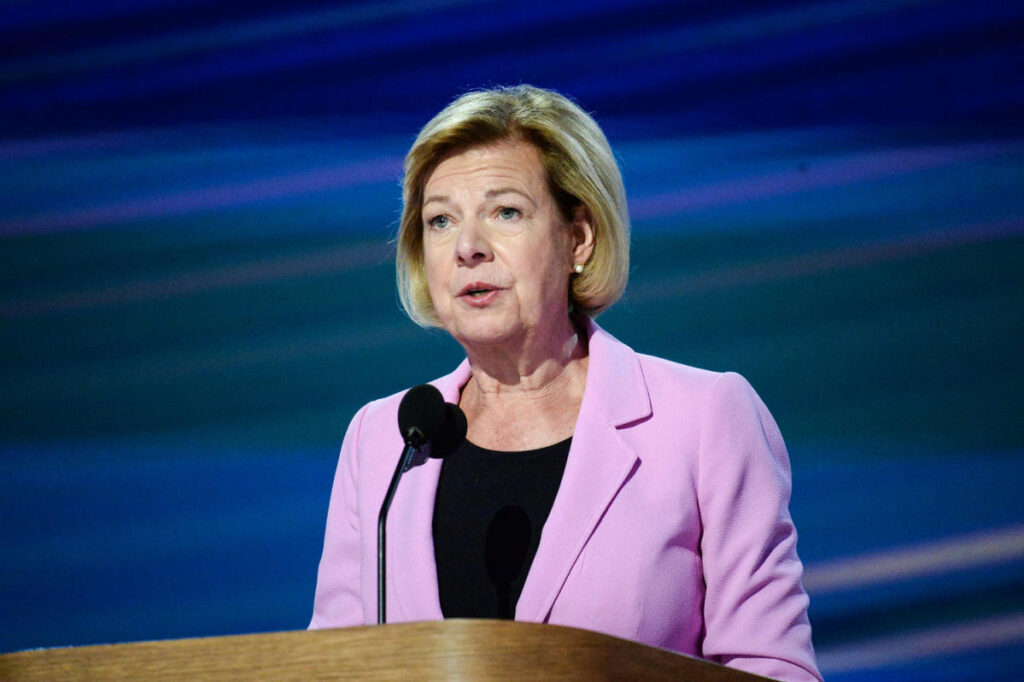In a significant legislative move, over 20 Democratic senators introduced an amendment to the National Defense Authorization Act (NDAA) aimed at removing a controversial provision that seeks to ban coverage of gender-affirming care for transgender children of service members. The NDAA, a comprehensive 1,800-page bill that typically includes funding and policy decisions for the Department of Defense, recently passed the House with a vote of 281-140. This bill not only allocates a staggering $895 billion for defense operations but also aims to set crucial policies affecting military personnel and their families for the coming year. The inclusion of the anti-trans provision, which prohibits medical treatment for military dependents diagnosed with gender dysphoria, has drawn strong opposition from several senators who argue that it undermines the rights of service members.
Senator Tammy Baldwin, who is spearheading the amendment and is set to be the Senate’s only openly LGBTQ member in the upcoming term, emphasized the importance of allowing military families to make their own healthcare decisions. Baldwin stated that the decision about medical treatment should be placed in the hands of parents who are actively serving and their doctors, rather than politicians. The consequences of this provision, if it remains in the NDAA, could significantly impact thousands of military families, with estimates suggesting that between 6,000 to 7,000 children of U.S. service members would be affected. Advocacy groups such as the Modern Military Association of America highlight the growing community of transgender youth within military families and stress that access to gender-affirming care can be life-saving.
The push for the amendment is set against a backdrop of increasing tensions in Congress regarding transgender rights, which have become a focal point amid broader cultural debates in the United States. The language incorporated into the NDAA was reportedly propelled by House Speaker Mike Johnson, who argued that the bill prioritizes what he deems “military lethality” over “radical woke ideology.” Johnson’s statements have indicated a broader agenda that also encompasses prohibitions against critical race theory and DEI initiatives in military settings. If the amendment does not succeed, the NDAA would create one of the first federal legal statutes targeting transgender individuals explicitly.
As discussions unfold, the Biden administration will be faced with a critical decision regarding the NDAA, as President Biden may choose to sign or veto the bill following its Senate vote, intended for later this week. The NDAA must be passed by Congress before the budget deadline of January 1. Failure to address these provisions may result in significant consequences for military families directly affected by such decisions. Additionally, the contentious climate surrounding transgender rights has been magnified by recent developments in Congress, such as the election of the first transgender representative, impacting both policy-making and the national dialogue on LGBTQ issues.
The coalition supporting the amendment includes notable Democratic figures and reflects a diverse geographical representation, with senators from Massachusetts, Hawaii, New Jersey, Illinois, and beyond joining Baldwin’s effort. Key Democratic leaders have acknowledged both the strengths and weaknesses of the NDAA, with Senate Majority Leader Chuck Schumer remarking on the necessity to find a balanced approach that still serves military families effectively while pushing against sections deemed harmful. Schumer’s remarks suggest potential negotiations to refine the bill, even as he refrained from explicitly mentioning the transgender provision during his remarks.
The ongoing debates and amendments within the NDAA not only highlight the specific issue of healthcare access for transgender children in military families but also reflect broader societal conflicts regarding LGBTQ rights. With legislative actions and public discourse intensifying, the resolution of the NDAA will serve as a crucial indicator of how bipartisan politics continues to navigate issues of identity, inclusion, and service within a historically conservative institution like the military. As the Senate prepares to vote on the NDAA, the implications for military families and the larger conversation surrounding transgender rights remain a pivotal aspect of this legislative battle.

